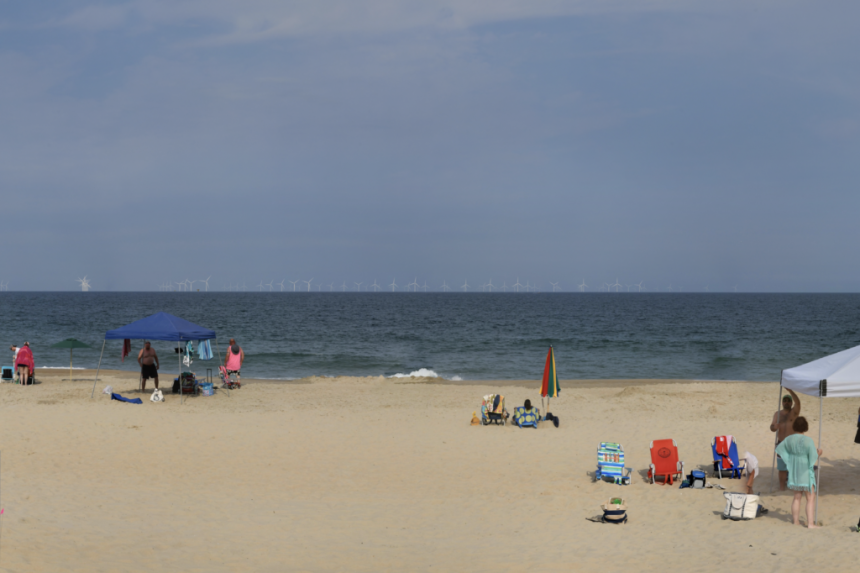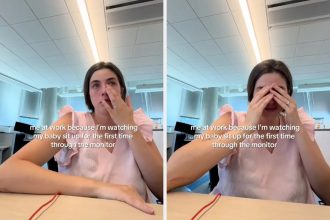A simulation of what the US Wind windfarm might look like from 84th Street in Ocean City. (Rendering courtesy US Wind)
Ocean City is pursuing every avenue in its ongoing fight to block an offshore wind farm — including one avenue that didn’t appear to exist until a month ago.
That’s when the Environmental Protection Agency told the state that it erred when it said appeals of the air quality permit it granted for the US Wind project could only be challenged in court. The proper venue is the agency’s Environmental Appeals Board (EAB), said the EPA, which ordered the state to rewrite its notice.
State officials refused and have challenged the EPA claim, as has US Wind, the developer behind the Ocean City project. Local environmental attorneys said the move appears to be an attempt by Trump’s EPA to “figure out ways to undercut what the Biden administration did,” by muddying the waters about how an appeal should proceed.
Ocean City’s attorneys “felt that the correct location was the EPA environmental appeals board” and filed its appeal there, said City Manager Terry McGean in a statement. But it filed in Worcester County Circuit Court, too, just in case.
“In order to make sure our appeal was not thrown out based on a procedural issue, we filed in both places. Apparently the EPA agreed with us,” McGean wrote.
It’s the latest twist in a long-running battle over the project, which calls for construction of 121 wind turbines about 10 miles off the Delmarva coast. When complete, the project could generate 2,200 megawatts of energy, enough to power up to 718,000 homes, according to the federal Bureau of Ocean Energy Management.
The project has the backing of the Moore administration and the administration of former President Joe Biden (D), which granted a key federal permit for it. But it has long been opposed by some leaders in tourism-dependent Ocean City, who fear the distant turbine towers will harm the view from the beach. Wind projects have another opponent in President Donald Trump (R).
The EPA appeals board recently took action against a different offshore wind project. In March, the appeals board revoked a Clean Air Act permit issued for New Jersey’s Atlantic Shores wind project during the Biden administration. The board sent the permit back to EPA for a new decision in light of a Trump executive order that paused new wind permitting and leasing, and required federal agencies to reevaluate their policies.
But, critically, that permit was issued by EPA’s Region 2 — not a state agency.
Local environmental attorneys called EPA’s arguments about the Maryland permit unconventional. Typically, a challenge to an air pollution permit issued by MDE would be filed in court in the county where the project is proposed, they said.
“I am a bit baffled by EPA’s assertion,” said Jon Mueller, director of the Environmental Law Clinic at the University of Maryland’s Francis King Carey School of Law, who said the administration may simply be looking for a way to block a Biden-era project.
“I’ve never seen it say you’ve got to go through the EAB before — unless there was some clear statutory requirement,” Mueller said.
In a previous statement to Maryland Matters, an EPA spokesperson criticized Maryland for not complying with its directive to reissue the air permit with instructions for appellants to go to the Environmental Appeals Board.
“They don’t seem to care about complying with legal requirements,” an EPA spokesperson said about MDE.
The appeals board is a three-judge panel that reviews permitting disputes involving federal statutes like the Clean Air Act. Members are appointed by the EPA administrator, to consider appeals on their behalf, but the board is “impartial” and “independent from all other agency components” outside the office of the administrator, according to its website.
The EAB is still considering whether it has jurisdiction to review the MDE-issued air permit for the Ocean City project. In an order issued Monday, the board required the EPA’s general counsel to chime in by Aug. 18.
Amy Van Blarcom-Lackey, regional EPA administrator for the mid-Atlantic, told Maryland on July 7 that it needed to defer to the EAB. That same day, Ocean City filed its appeal with the EAB, making arguments similar argument to Trump’s EPA.
SUBSCRIBE: GET THE MORNING HEADLINES DELIVERED TO YOUR INBOX
The city’s attorney, Nancie Marzulla, wrote that EPA delegated authority to MDE to issue the Clean Air Act permit, but the federal agency “retains oversight” over the permit, in part because it covers a project on the outer continental shelf, a “federal enclave,” Marzulla wrote.
Both of Ocean City’s filings — in court and before the appeals board — challenge MDE’s construction permit on several grounds, arguing that MDE failed to consider alternatives for the offshore wind project, issued the permit late and relied on uncertain emissions estimates for construction vessels, among other faults.
US Wind believes that the town’s appeal is “less about air quality and more about the very existence of the Project,” wrote Toyja E. Kelley, Sr., an attorney for the company, in a filing before the appeals board. “Be that as it may, Petitioners have a right to challenge the MDE Permit, but only in the forum legally authorized to hear them out: a Maryland Circuit Court.”
Liz Burdock, president and CEO of Oceantic Network, a trade group supporting offshore wind development, agreed with US Wind, saying in a statement that she has “full confidence” in Maryland’s permit — and the state’s appeals process.
MDE “issued the permit for US Wind after a lengthy, well-documented, science-based approach that followed years of precedent and included US EPA Region 3 every step of the way,” Burdock wrote.
In its filing with the EPA board, the Baltimore-based wind developer contended that MDE followed the rules when it issued the air permit. It also argued that the air emissions tied to the project will occur “almost exclusively” during the construction and commissioning phase, thanks to engines aboard construction vessels and diesel generators on the offshore substations before they are connected to the electrical grid.
The turbines themselves “will generate no air emissions,” US Wind wrote, “and in fact will displace electricity that would otherwise be generated by fossil fuel powered sources that have historically created significantly more air emissions.”
In its filing with the appeals board, MDE wrote that EAB lacks jurisdiction based on past precedent, and Ocean City’s petition misconstrues federal law. It warned that an “improvident grant of jurisdiction could result in conflicting judicial rulings given the Petitioners concurrent filing currently proceeding in the Maryland courts.”
Phil Federico, a Maryland environmental attorney who handles class action suits related to groundwater and air pollution, said he also found it strange that EPA was arguing the wind permit should go to its appeals board.
“It’s a novel argument,” Federico said. “And I think they’re relying heavily on the fact that the Clean Air Act permits the EPA to delegate authority to the state to issue Clean Air Act permits.”
Federico said it seems as though the federal agency, having already delegated authority to Maryland to enact Clean Air Act permits on the outer continental shelf, is now moving the goalposts.
“If you’re going to delegate this authority to MDE, and they do issue a Clean Air Act permit consistent with the EPA standards, then I don’t see the problem,” Federico said. “My guess is this is probably — to some degree — being impacted by political preference.”
In its filing, MDE also argued that many of Ocean City’s contentions were not brought forward during the public comment period, making them ineligible subjects for an appeal.
The state still countered each deficiency cited by Ocean City, arguing that it was allowed to rely on previous alternative analyses conducted by the U.S. Department of the Interior, that its vessel emissions estimates were sound and that the permit underwent ample public comment.
Responding to the contention that the appeals board should overturn the permit because it was issued after a statutory deadline, MDE argued that would be an “absurd” remedy, since the deadline was set to protect permit applicants from a never-ending review process.
“A contrary ruling would allow an agency to avoid ever having to make a decision,” reads MDE’s filing.









